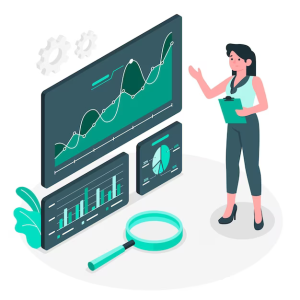Data is everywhere and is becoming increasingly important. Besides, there’s no point in simply having data and not knowing how to unleash its full potential. Fortunately, the best part is that turning data into visuals can do wonders! Sounds interesting! Well, data visualization is the answer. It makes it super-easy to interpret data, presenting it in an easy-to-understand format—for example, graphs, charts, infographics, etc.
Data visualization offers actionable insights your business couldn’t have found otherwise. Different types of data visualization tools are available, versatile, easy to use, and tailored according to your specific business needs. In this article, we’ll delve into what data visualization is and the different types of data visualization tools for your business. Let’s begin!
What is a Data Visualization Tool?
Data visualization is visualizing a data set’s trends, patterns, and key insights. Further, data visualization tools are software that allows you to generate visualization of small to large data sets. The top data visualization tools can be used for different purposes, such as annual reports, sales and marketing, dashboards, etc. Most types of data visualization tools are feature-rich and come with prebuilt templates for creating visualizations.
Some of the popular data visualization tools are listed below:
- Pie charts: depict the percentage breakdown
- Tables: data that’s too complex for text
- Timelines: sequence of events over time
- Scatter Plots: the relationship between two data sets.
Types of Data Visualization Tools
While there are hundreds and hundreds of data visualization tools available, there are some which stand out. Here are the different types of data visualization tools that are popular in the industry and help you visualize large data sets.
Tableau
Tableau is a renowned and easy-to-use data visualization tool owned by Salesforce. Adopted by big-size companies, Tableau can efficiently connect to different data sources and easily create maps or charts. Further, it has desktop, server, web-based, and Customer Relationship Management (CRM) versions.
Pros:
- Can handle a large amount of data
- Ability to import data from different sources
- Mapping capabilities
- Mobile friendly
- High performance
- Lots of resources available on how to use Tableau
Zoho Analytics
Zoho Analytics is another well-known and best data visualization tool apt for professionals looking forward to visualizing business intelligence. The software is opted for by 2 million users, including big brands like Suzuki and Hyundai.
One of the benefits of Zoho Analytics is that its user-friendly dashboard can easily visualize information related to sales, marketing, revenue, and costs. It also creates an engaging user experience by allowing you to share or publish your reports, comment, and do more with your colleagues.
Pros
- Export Zoho Analytics report in any format: PDF, Microsoft Word, Excel, PPT
- Embed data visualization to your website with less or no code
- Has a range of pre-set templates
- Good customer support
Power BI
Power BI is a data visualization tool Microsoft developed that smoothly integrates with Microsoft products. Organizations heavily relying on the Microsoft environment broadly use Power BI. Another point is that Microsoft Power BI offers self-service analytics tools to analyze, aggregate, and share data in an insightful format. Plus, Microsoft’s AI program can prepare and analyze the data automatically.
Pros:
- Highly secured
- Ideal for teams
- Interactive dashboards and reports
- Very user friendly
Infogram
Infogram is among the best data visualization tools that stand out with their top-notch features. Infogram is fully featured and majorly intended to assist users in quickly creating interactive reports, infographics, dashboards, and social media posts with meaningful information and appealing visuals. The completed visualizations can be extracted in any format, such as PNG, PDF, GIF, and HTML.
Pros
- It has an easy-to-use interface
- Access to a range of customizable templates
- It can be seamlessly integrated with other tools and platforms
Qlik Sense
Qlik Sense is a top data visualization and analytical platform that lets users explore and interpret data effectively. It is well-known for its next-level analytical capabilities and cloud deployment ability. Qlik Sense has a user-friendly interface makes it easy for users with less or varying technical know-how.
Pros
- Scalable for large volumes of data
- Ironclad security features
- Collaborative capabilities for group projects
- Quick deployment of custom applications
Unlock Meaningful Insights from Your Data
Businesses can drive innovation, make decisions, and gain an edge by converting complex data into high-quality visual representation. The best data visualization tools are game-changers and offer the required features and ease of use to meet your needs best. At the same time, the right one depends on your budget and the features you expect.
Some of the critical advantages of data visualization tools are:
- Understand large or complex data sets quickly
- Drive meaningful insights
- Spot trends in data sets
To know more about such top tools, visit our blog posts and stay updated with the latest tech advancements.
Also Read:
Spotfire vs. Tableau: Which Data Visualization Software is better?


